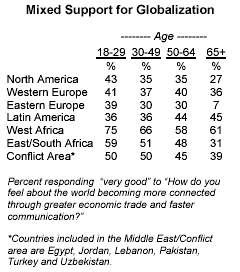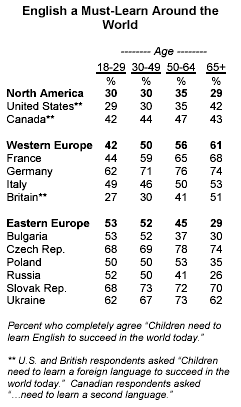The Pew Global Attitudes Project recently released the results of a study that show remarkable differences between how different age groups (and cultures) view globalization. You can download the complete report here. It’s an excellent read. Here’s an excerpt:
Older Americans and Western Europeans are more likely than their grandchildren to have reservations about growing global interconnectedness, to worry that their way of life is threatened, to feel that their culture is superior to others and to support restrictions on immigration. This generation gap is less pronounced in Eastern Europe and is virtually nonexistent in Asia, Africa, and the Middle East. Nevertheless, Americans and Western Europeans of all ages are less likely than people in other parts of the world to tout their own cultural superiority and are less wary of foreign influence.
Here’ a graphic that breaks down the numbers. Across every region, the youngest age groups are most enthusiastic about globalization.

English viewed as âmust learnâ language
The following visual illustrates how important learning English is within non-English-speaking countries.

People in the US and Britain were asked how important is is for children to learn an additional language. I find it sad to see such low responses overall, but I am not surprised. Perhaps when the number of Spanish-speaking Americans surpasses 100 million (less than a decade from now) we will see drastically different responses.
Anyway, this report is worth a read. You can download it here.
